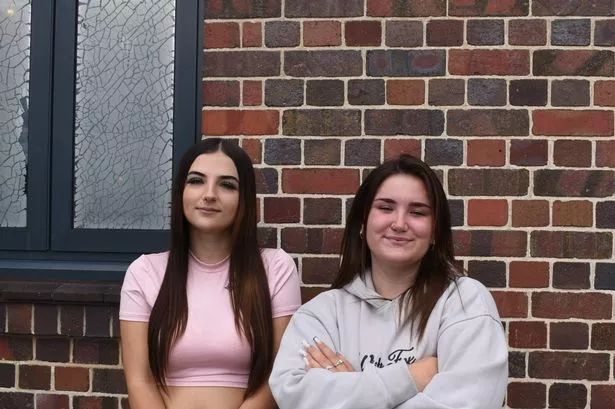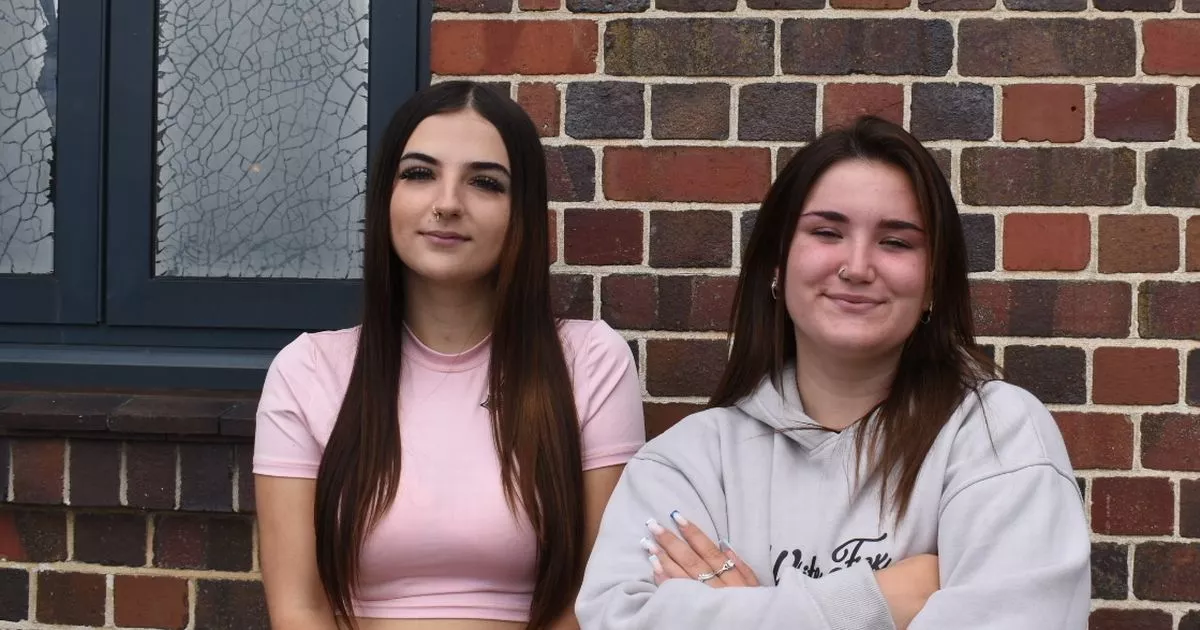They have bravely spoken out about the barriers facing young people in the city, as statistics show nearly 700 are in a similar position Mia and ‘Sarah'(Image: Alex Seabrook)
Mia and ‘Sarah'(Image: Alex Seabrook)
Two Bristol teenagers have shared how knife crime and mental health struggles led them to drop out of school with no GCSEs. The two 17-year-olds spoke about the barriers facing young people and why hundreds their age in Bristol are not in education, employment or training.
Last month a committee at Bristol City Council heard how nearly 700 teenagers aged 16 and 17 aren’t in education, training or employment, with bad buses and blasé businesses cited among reasons for the high number of young people not working or studying.
Poor public transport means some people on the outskirts of the city struggle to access colleges or jobs, while getting work experience can be hard with many firms in the city reluctant to offer opportunities. Speaking to the Bristol Live, one young woman said school exclusions make her feel like she’s been “stopped from wanting a future”.
Another young woman said “school was the last thing on my mind” after two of her friends were murdered last year. But a local charity is running an inspiring programme to help teenagers like them get back into education.
Mia’s story
Mia got kicked out of two schools but started doing the NEET programme with the Robins Foundation, the Bristol City FC charity, in January this year and has volunteered for an open day too. She has been out of education since December last year. Her ideal career is becoming an air hostess, but there are obstacles getting in the way of her fulfilling that dream.
She said: “I got kicked out of mainstream school in Year 10, and then probably three months into Year 11 I stopped going to school. I was with this boy and I wanted to go to South Bristol Skills College. He went there.” The emotions of their subsequent break-up escalated and led to safeguarding issues, she explained, meaning she was not allowed to attend that college as hoped.
Mia added: “Around the time that was all going on, I had just been moved into supported living. Originally I got moved out of Bristol for about a month, and that was really hard because I didn’t have any of my family or friends around. I’m adopted anyway and that went a little bit wrong. It wasn’t just them saying ‘you need to leave’, it was kind of joint because I wanted more independence.
“But there were no placements available in Bristol at the time, so I got moved up to Gloucester. I live in Kingswood now, still in supported living. I don’t like having staff in the house, it’s so annoying. They have to follow all these rules but I find it controlling. When you’re in care it feels like they have control over you. Every single thing literally gets written down.”
A common problem across Bristol is school exclusions, which can block young people from getting onto a good path in life. Schools are facing calls this week to stop excluding pupils, partly due to worrying links to knife crime and gang violence. And even though Mia has turned a corner over the past few years, she still can’t attend the college she wants to go to.
Mia added: “I want to be an air hostess, but I can’t do any courses on that. The course that I want to do is at the college I’m not allowed to go to. It doesn’t feel fair because it feels like I’m being stopped from wanting to have a future just because of one person at that college.”
Sarah’s story
Sarah (not her real name) was friends with both Max Dixon and Mason Rist, who were murdered in January last year in Knowle West, although she was closer with Max. Before that, her mental health suffered during the pandemic, with severe paranoia.
She said: “I struggled really badly with it, because I wasn’t familiar with losing anyone yet. There were a lot of court trials and stuff going on which I attended and school was just the last thing on my mind. So I just packed it in and was like ‘I can’t do it any more’. I didn’t go back for Year 11 or my GCSEs.
“My mental health took a massive turn in Covid. I couldn’t be left alone in the house. I used to climb out of my bedroom window because I thought someone was in the house. I wouldn’t walk to the shops because I thought someone was following me. I struggled in Year 10 and I was in and out of school.
“I was doing really well in Year 11 and then I lost my friend in January. Then it was the last thing on my mind to even think about going to school. But I go to college now with a group that I really like. I do sports media, which I really love. It’s uplifting, in a way. The anxiety and stuff is still there, but it’s got a lot better since starting college again.”
This September Sarah has just started Year 13, and has been back in college for just over a year now. While most colleges don’t accept people without any GCSEs, one exception is Boomsatsuma, an education provider based in Bristol which specialises in creative and digital industries. They also give maths and English lessons, so people can resit their GCSEs.
Boomsatsuma is launching a new supported internship pilot this September, too. Sarah also volunteered with the Robins Foundation for five years and has begun doing paid work there. In the longer term, she hopes to become a travel journalist.
She added: “Most courses ask for a certain amount of GCSEs. I know I’m not the only one who came away with none. I’m lucky that my college let me sit them there. I’m still resitting them now, like a year and a half later. That’s one of the biggest barriers is kids not getting the qualifications they need to do the course that they want.
“They might have had no interest in school whatsoever. I didn’t frankly, in Year 8 and Year 9. Some colleges are like ‘if you didn’t get the grades, that’s your problem’. [Boomsatsuma] offers a lot of one-to-one help with mental health, and the staff are really good. Even if it’s not what I want to do, it’s still aiming for what I want to do in the long run.”
Dani Southwick works as a youth mentor for the Robins Foundation and leads the NEET programme. She supports young people across South Bristol, helping them get back into education or a job. Earlier this year she took part in an extensive research project, exploring why young people in Bristol end up not in education, employment or training.
She said: “To bring people in, I found that it works much better to put yourself into various areas of the community and then provide something that’s fun and relaxed to come to. It’s not like ‘you need to be here at this time, you must come every week’. We’re just starting that engagement.
‘Barriers’ after mistakes
“Then once you’ve built that relationship over a period of weeks, that’s when you start to offer different services or signpost, because that person will then trust you a bit more, and you can have a better idea of how you can pinpoint the support you give as well.
“It’s never been a case of ‘I don’t want to do anything’ from any of the young people. They all have something they want to do. When you’re 14 or 15, obviously we all make mistakes at that age. When you’ve matured, you shouldn’t have all these barriers put in front of you, if you’ve put in the work and tried to get yourself in a good place. It can be quite demoralising.”
She said that in some parts of Bristol, some parents can struggle to know what career options and opportunities there are for their children. For example, Mia is now looking at volunteering in a summer camp in the US next year, as part of the renowned Camp America programme.
Dani added: “With depression and mental health, sometimes these conversations will arise after playing a five-a-side match with your friends, and somebody goes ‘how are you doing’, and suddenly it all pours out because you’ve let off some steam, you’re in a place where you feel safe and you know the person.
“That friend might then direct you to somewhere else, and because you’ve heard it from a trusted source, you might be more inclined to go ahead and do it. Sometimes if you’re feeling depressed, it’s the last thing you can do to think I’m going to find a therapist or counsellor. And everyone is different as well.
“It’s very easy to say there’s 160 NEET young people in Hartcliffe. But every single one of those people have a different story and a different journey, need different support and want to do different things. That’s why you need to tailor it so much, and you can get the best results when you really listen to them and what their needs are.”
When asked how hopeful they were for the future, both Mia and Sarah said they were scared. Knife crime remains a fear and applying for jobs without experience is a struggle.
Sarah said: “Because you hear on the news all these things about knife crime, it makes you scared to leave the house. My friend died five minutes down the road. One day maybe I’ll be going to work and it happens to me or someone else that I know. And you’re online looking for jobs, but they literally don’t give you anything because you need experience.”
Mia added: “It’s the fact of not knowing where you’re going to end up or what you’re going to be doing. It’s scary because you don’t know what your future is actually going to look like.”
